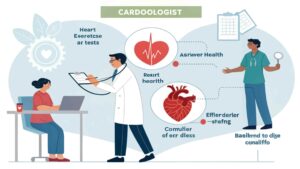A cardiologist is more than a doctor who treats heart disease; they play a key role in preventing it. By assessing risk factors, a cardiologist helps patients take proactive steps to protect their heart health. Through regular screenings and early interventions, cardiologists empower individuals to lower their risks and maintain stronger, healthier hearts for the long term. Here are the roles of a heart specialist in preventing heart disease:
Identifying Risk Factors
A fundamental step in preventing heart disease is identifying risk factors before they lead to serious problems. A cardiologist is trained to spot these risks through comprehensive evaluations. During a visit, your cardiologist will review your medical history, family history, and lifestyle choices. They may also conduct physical exams and order specific tests to get a clear picture of your heart health.
These tests can include blood pressure measurements, cholesterol screenings, and blood sugar tests. By identifying potential issues early, a heart doctor can intervene before they cause lasting damage to your heart and blood vessels. This is a key benefit of seeing a cardiologist for preventive care.
Creating Personalized Prevention Plans
After identifying your specific risk factors, a cardiologist will work with you to create a personalized prevention plan. This plan is not a one-size-fits-all solution; instead, it is tailored to your individual health needs and lifestyle. The goal is to manage your risks and promote long-term heart health.
A personalized plan is more effective because it addresses the unique factors contributing to your cardiovascular risk. Your plan may include dietary changes with a focus on eating a heart-healthy diet low in saturated fats and sodium. It may also include guidance on the type and amount of physical activity that is safe and helpful for you. Your cardiologist will also discuss medications if they are necessary to control conditions like high blood pressure or cholesterol.
Ongoing Health Monitoring
Preventing heart disease is an ongoing process that requires regular monitoring. Your cardiologist plays a key role in tracking your progress and adjusting your prevention plan as needed. Follow-up appointments allow your heart health doctor to check your blood pressure, review lab results, and discuss how you are managing your lifestyle changes.
Regular check-ins also provide an opportunity to address new symptoms or concerns. If your health status changes, your cardiologist can modify your treatment plan accordingly. This helps prevent minor issues from becoming major health problems.
Educating Patients
A cardiologist also serves as an educator, providing you with the information you need to take control of your heart health. They can explain complex medical information in a way that is easy to understand. This empowers you to make informed decisions about your daily habits and medical care.
Your heart specialist can offer resources and support to help you stick to your prevention plan. This may include connecting you with nutritionists, smoking cessation programs, or providing educational materials about your condition. When patients understand the reasons behind their prevention plan, they are more likely to follow it.
See a cardiologist today
A cardiologist is a key partner in preventing heart disease. From identifying risks early to providing ongoing support, a cardiologist guides you towards better heart health. Contact a trusted cardiology practice near you and book an appointment to see a cardiologist for heart concerns today.















